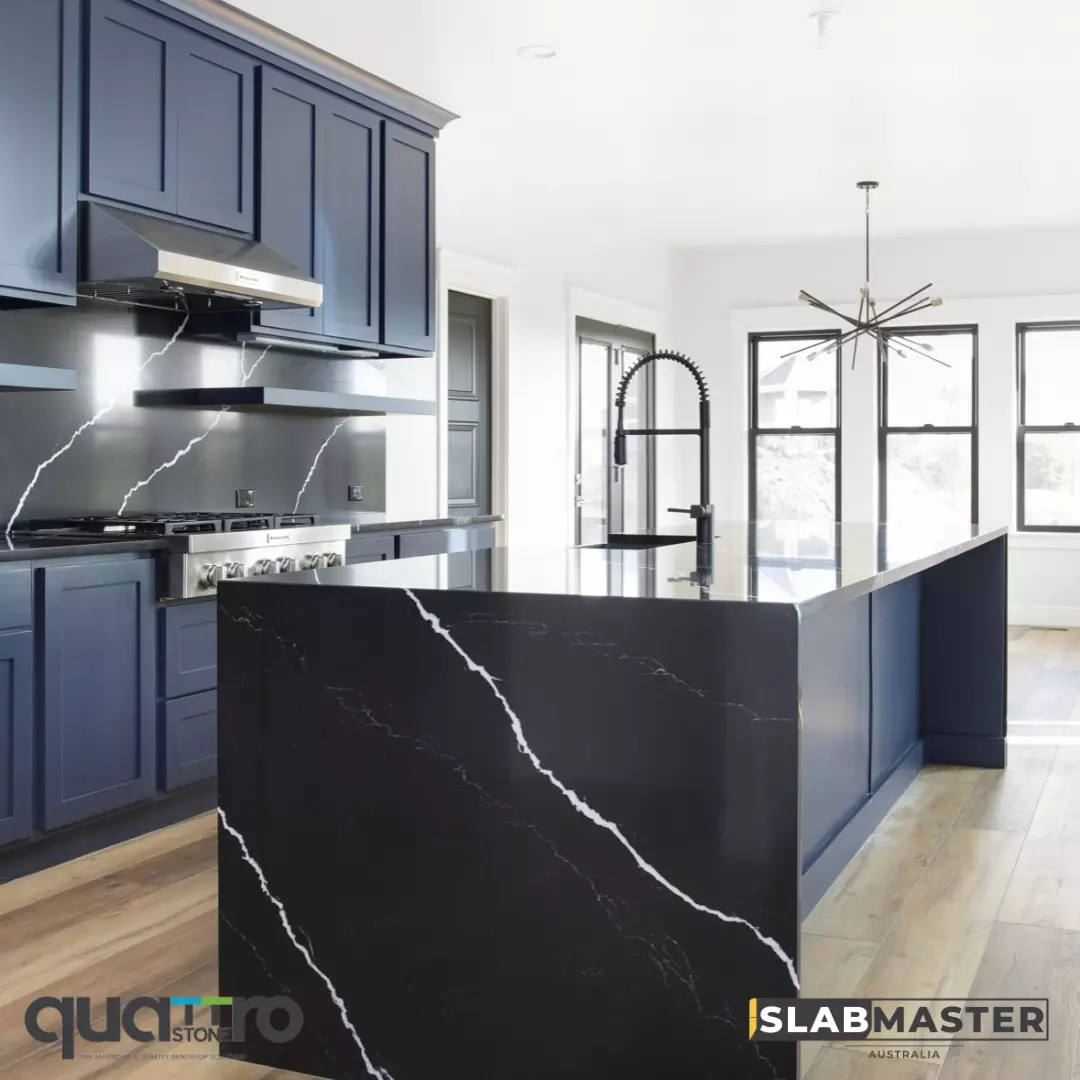Understanding the Differences Between Zero-Silica Mineral Surfaces and Granite Benchtops

A kitchen with black marble countertops and black cabinets is both elegant and modern.
As one of the most prominent surfaces in the room, benchtops significantly impact your kitchen’s overall look and feel. For this reason, nailing this element is essential when remodelling or creating the kitchen of your dreams.
There are many choices to make. Do you want the benchtop to complement the existing décor or to add a bold pop of colour? Are you thinking sleek and modern or textured and rustic?
The questions are seemingly endless, but most come back to an essential choice – the choice of material. For many homeowners, this choice boils down to two contenders: granite and zero-silica mineral surfaces.
Mineral Surfaces vs. Granite Benchtops: Which Is Better?
To the untrained eye, mineral surfaces and granite benchtops look the same. However, these two materials look and perform differently in a kitchen.
Composition
Appearance
The composition of mineral surfaces and granite stone benchtops directly influences their appearance in your kitchen. Since granite is a completely natural stone, mother nature dictates the benchtop design. No two stone slabs are the same, so you can rest assured that your benchtop will be unique.
However, this uniqueness comes at a cost. If you want an all-natural look, be prepared to embrace natural imperfections. Also, matching your benchtop to your backsplash (one of the major kitchen trends currently) can be challenging.
Engineered surfaces like mineral surfaces give you more control over the final look of your benchtop. You can choose forms that resemble granite in colour and texture but are more uniform. Or, you can make a bold statement and transform your benchtop into something like an eye-catching galaxy black surface.
With a zero-silica mineral surface benchtop, you’ll get:
- A broader selection of colours
- A consistent look throughout the element
- No visible seams
Cost
Mineral surfaces and granite are premium benchtop materials meaning they both have a higher price tag as they are super durable, easy to care for, gorgeous and last a lifetime. Although both materials are comparable in pricing, a mineral surface benchtop can cost slightly less due to increased availability.
Longevity
When it comes to longevity, stone is king. So, it shouldn’t be surprising to hear that a granite or mineral surface benchtop can last a lifetime. Not only that but with proper care, they can show no signs of wear and tear for decades. Some manufacturers even offer lifetime warranties for their benchtops.
While mineral surfaces and granite are similar in longevity, maintenance and care of mineral surface benchtops is much simpler. Because mineral surfaces are much less porous than natural stone granite, they don’t require sealing and are significantly more resistant to staining and heat.
Ease of Installation
Neither mineral surfaces nor granite benchtops are particularly DIY-friendly. These elements are weighty and challenging to manipulate, so their installation should be left to the professionals.
Maintenance and Care
When it comes to cleaning, mineral surfaces are more low-maintenance than granite. Because mineral surfaces are much less porous than natural stone granite, they don’t require sealing and are significantly more resistant to staining and heat.
If you choose a granite benchtop, you should:
- Apply a sealant upon installation and every one to three years afterwards
- Wipe liquids from the surface quickly to avoid stains
- Avoid leaving hot pots and appliances on the surface for too long, as the benchtop can crack due to a thermal shock
- Avoid chopping food directly on the surface to prevent scratches
While a mineral surface benchtop can benefit from similar precautions, it is more durable than granite.
Timeless Elegance, Endless Possibilities
In terms of interior design trends for kitchens, stone benchtops remain ever-popular. So, whether you choose a granite or a mineral surface benchtop, your kitchen will never go out of style.
However, there has been a growing trend toward adding more colour, texture, and personality to kitchen designs. And only mineral surface benchtops can make this happen. Throw the many other benefits of mineral surface benchtop into the mix, and you get the perfect choice for your kitchen.
Discover the marvellous world of Quattro Stone’s mineral surface benchtops, and get in touch with our representatives to start turning your vision into reality.
